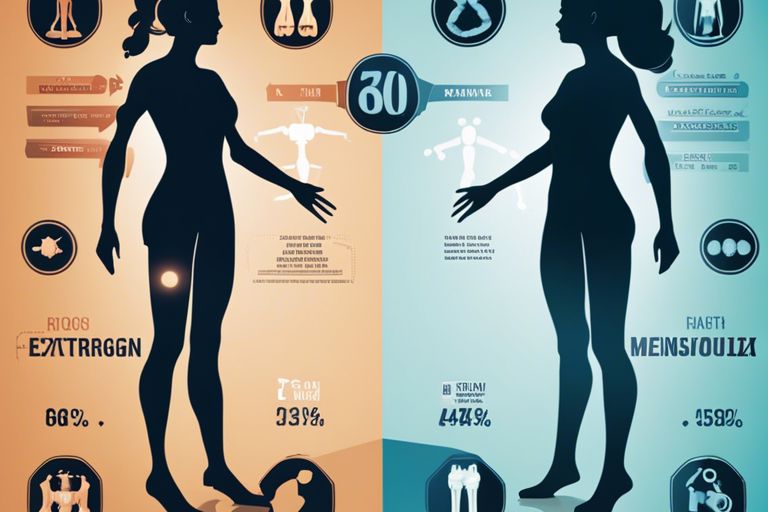Menopause is a natural biological process that every woman will experience as she ages. It marks the end of reproductive years, usually occurring in the late 40s to early 50s. During this time, the body goes through various hormonal changes, leading to symptoms such as hot flushes, mood swings, and changes in menstrual cycles. Understanding menopause is vital for every woman to navigate this transition period with knowledge and confidence. This blog post aims to provide the basics of menopause, its symptoms, and ways to manage them effectively, empowering women to embrace this new phase of life with grace.
Key Takeaways:
- Menopause is a natural phase: Menopause is a natural biological process that marks the end of a woman’s reproductive years.
- Common symptoms: Symptoms of menopause may include hot flushes, night sweats, mood swings, and changes in libido.
- Hormonal changes: Menopause is characterised by a decrease in oestrogen levels, which can lead to various physical and emotional changes.
- Health risks: Menopause can increase the risk of osteoporosis, heart disease, and other health issues, emphasising the importance of regular health checks.
- Treatment options: Treatments for managing menopausal symptoms include hormone replacement therapy, lifestyle changes, and alternative therapies; it’s important to consult with a healthcare professional.
The Biological Process of Menopause
Hormonal Changes
During menopause, a woman’s body undergoes significant hormonal changes. The ovaries reduce the production of oestrogen and progesterone, leading to irregular menstrual cycles and eventually stopping altogether. This hormonal shift can result in various physical and emotional symptoms.
Physical Stages: Perimenopause, Menopause, and Postmenopause
Perimenopause is the transitional phase leading up to menopause, marked by fluctuating hormone levels and irregular periods. Menopause officially begins when a woman has not had a period for 12 consecutive months. Postmenopause follows, signifying the years after menopause has occurred. During postmenopause, many of the menopausal symptoms may still persist, but they generally become less severe over time.
Symptoms and Management
Common Physical Symptoms
Common physical symptoms of menopause include hot flushes, night sweats, fatigue, and joint pain. These symptoms can significantly impact a woman’s quality of life and may vary in severity from person to person. It is crucial to consult a healthcare professional to discuss management options.
Coping Strategies and Treatments
Concerning coping with menopausal symptoms, there are various strategies and treatments available. Lifestyle changes such as regular exercise, a healthy diet, and stress management techniques can help alleviate symptoms. Hormone replacement therapy (HRT) and alternative therapies like acupuncture and herbal supplements can also be considered under the guidance of a healthcare provider. It is crucial to explore different options and find what works best for you.
Lifestyle and Wellness
Diet and Nutrition
During menopause, it’s vital for women to focus on maintaining a healthy diet and nutrition plan. Eating a balanced diet rich in fruits, vegetables, whole grains, and lean proteins can help manage symptoms such as hot flashes, mood swings, and weight gain. Incorporating foods high in calcium and vitamin D is also important to support bone health and reduce the risk of osteoporosis.
Exercise and Stress Reduction
Regular exercise and stress reduction techniques are key components of managing menopausal symptoms and promoting overall well-being. Engaging in activities such as yoga, Pilates, walking, or swimming can help reduce stress, improve mood, and enhance physical fitness. Additionally, practising relaxation techniques like deep breathing, meditation, or mindfulness can help alleviate anxiety and promote better sleep during this transitional phase of life.
Long-term Health Considerations
Bone Health and Osteoporosis
During menopause, a woman’s oestrogen levels decrease, which can lead to a higher risk of osteoporosis. Osteoporosis is a condition where bones become weak and brittle, increasing the likelihood of fractures. It is crucial for women to focus on maintaining good bone health through a balanced diet rich in calcium and vitamin D, regular weight-bearing exercise, and possibly medication to prevent bone loss.
Cardiovascular Health after Menopause
After menopause, women’s risk of heart disease increases significantly. This is due to the decline in oestrogen levels, which may have previously offered some protection to the heart. It is crucial for women to prioritise cardiovascular health by leading a heart-healthy lifestyle, including regular exercise, a balanced diet, maintaining a healthy weight, not smoking, and managing stress. Regular check-ups with a healthcare provider can help monitor cardiovascular health and prevent any potential issues.
Emotional Well-being and Support
Psychological Effects of Menopause
Menopause can bring about a range of psychological effects, including mood swings, irritability, anxiety, and feelings of sadness or depression. These symptoms are often a result of hormonal changes and can have a significant impact on a woman’s emotional well-being during this transitional phase in her life.
Seeking Support from Family, Friends, and Healthcare Providers
It is vital for women going through menopause to seek support from their loved ones, friends, and healthcare providers. Talking openly about their feelings and experiences can help women feel understood and supported. Healthcare providers can offer guidance on managing symptoms and may suggest treatments or therapies to improve emotional well-being.
Understanding Menopause – The Basics Every Woman Should Know
Menopause is a natural biological process that every woman will experience. It marks the end of menstrual cycles and fertility, typically occurring in their late 40s to early 50s. Common symptoms include hot flushes, night sweats, mood swings, and changes in libido. Understanding menopause is crucial for women to navigate this phase with knowledge and grace. Consulting healthcare providers for support and potential treatment options is recommended. Maintaining a healthy lifestyle, including regular exercise and a balanced diet, can help manage symptoms. Embracing menopause as a new chapter in life rather than a negative experience is empowering. By educating ourselves and seeking support, women can approach menopause confidently and with a positive outlook.
FAQ
Q: What is menopause?
A: Menopause is a natural biological process that marks the end of a woman’s menstrual cycles. It typically occurs in women in their late 40s to early 50s.
Q: What are the common symptoms of menopause?
A: Common symptoms of menopause include hot flushes, night sweats, mood swings, vaginal dryness, and irregular periods.
Q: How long does menopause typically last?
A: Menopause can last for several years, with the average duration being around four years. However, some women may experience symptoms for a shorter or longer period.
Q: What are the health risks associated with menopause?
A: Menopause can increase the risk of osteoporosis, heart disease, and weight gain. It is necessary for women to maintain a healthy lifestyle and attend regular check-ups with their healthcare provider.
Q: How can menopause symptoms be managed?
A: Menopause symptoms can be managed through lifestyle changes, hormone replacement therapy, and alternative therapies such as acupuncture or herbal supplements. It is important for women to discuss their options with their healthcare provider to find the most suitable treatment plan.





